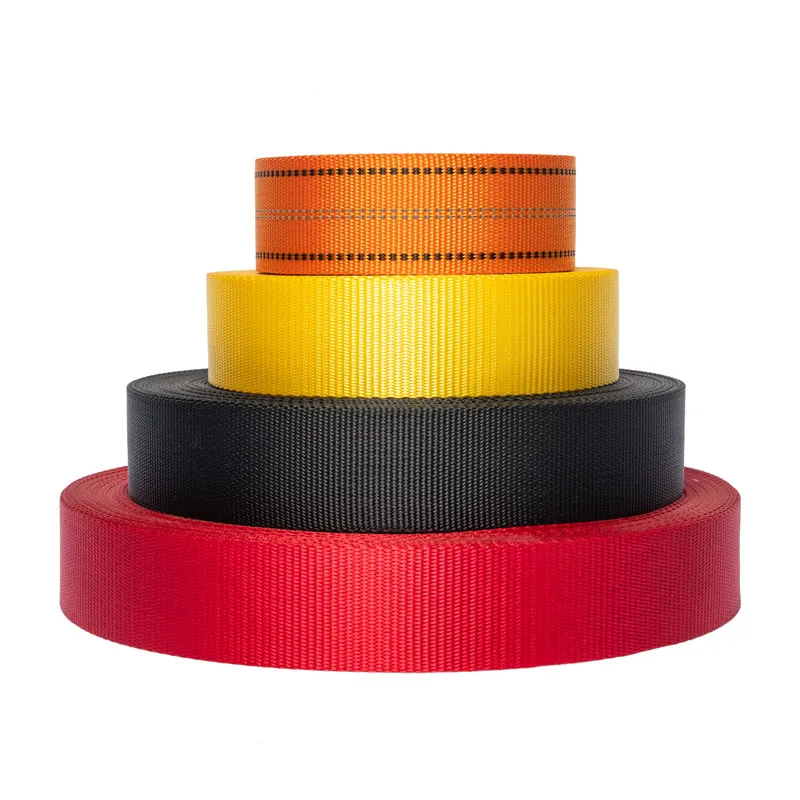Choosing the Right Polyester Webbing for Your Needs
2024-08-13
Polyester webbing is a popular material used in various applications, but not all polyester webbing is created equal. With different types, strengths, and features available, selecting the right webbing for your specific needs can be challenging. In this blog, we’ll guide you through the key factors to consider when choosing polyester webbing, ensuring you get the right product for your project.

Understanding the Different Types of Polyester Webbing
Polyester webbing comes in various types, each designed to meet specific requirements. The main types include:
1. Standard Polyester Webbing: This is the most common type of polyester webbing, offering a balance of strength, flexibility, and durability. It’s suitable for general-purpose applications, such as straps, belts, and lashing systems.
2. Heavy-Duty Polyester Webbing: For applications that require extra strength, heavy-duty polyester webbing is the ideal choice. It is thicker and stronger than standard webbing, making it suitable for industrial uses like lifting and securing heavy loads.
3. Tubular Polyester Webbing: Tubular webbing is designed with a hollow, tubular structure, providing extra cushioning and flexibility. It’s commonly used in climbing, rescue operations, and other activities where a softer, more pliable webbing is needed.
4. Patterned and Colored Polyester Webbing: Available in a wide range of colors and patterns, this type of webbing is often used in fashion, accessories, and branding. While it offers the same strength as standard webbing, its aesthetic appeal makes it popular for visible applications.
Key Factors to Consider When Choosing Polyester Webbing
Selecting the right polyester webbing involves considering several factors that can impact its performance and suitability for your project:
1. Strength Requirements: Determine the load-bearing capacity needed for your application. Polyester webbing comes in different tensile strengths, so it’s important to choose a webbing that can handle the expected weight and stress.
2. Environmental Conditions: Consider the environmental factors the webbing will be exposed to. Polyester webbing is resistant to UV radiation and moisture, making it suitable for outdoor use. However, if your application involves exposure to chemicals or extreme temperatures, additional considerations may be necessary.
3. Width and Thickness: The width and thickness of the webbing affect its strength, flexibility, and suitability for specific applications. Wider and thicker webbing provides more strength but may be less flexible, while narrower webbing is more pliable but may not be as strong.
4. Color and Aesthetics: If appearance is important for your application, such as in fashion or branding, consider the color and pattern options available. Polyester webbing can be dyed in various colors and printed with patterns, allowing for customization to match your brand or design needs.
5. Cost Considerations: Polyester webbing is generally cost-effective, but prices can vary based on the type, strength, and customization options. Consider your budget when choosing the webbing, balancing cost with the required performance and aesthetics.
Applications and Use Cases
Understanding the specific use case for your polyester webbing will help you make an informed decision:
- Outdoor Gear: For backpacks, tents, and other outdoor equipment, choose standard or heavy-duty webbing that offers the strength and durability needed for rugged use.
- Safety Equipment: For harnesses, seat belts, and other safety gear, select heavy-duty webbing with high tensile strength and low stretch.
- Fashion and Accessories: In fashion applications, patterned and colored webbing can add visual appeal to products like belts, bag straps, and pet collars.
Conclusion
Choosing the right polyester webbing is essential for ensuring the success of your project, whether it’s for industrial use, safety equipment, or fashion accessories. By considering factors such as strength, environmental conditions, width, and aesthetics, you can select the ideal webbing that meets your specific needs. Polyester webbing offers a versatile and reliable solution, making it a go-to material for a wide range of applications.


